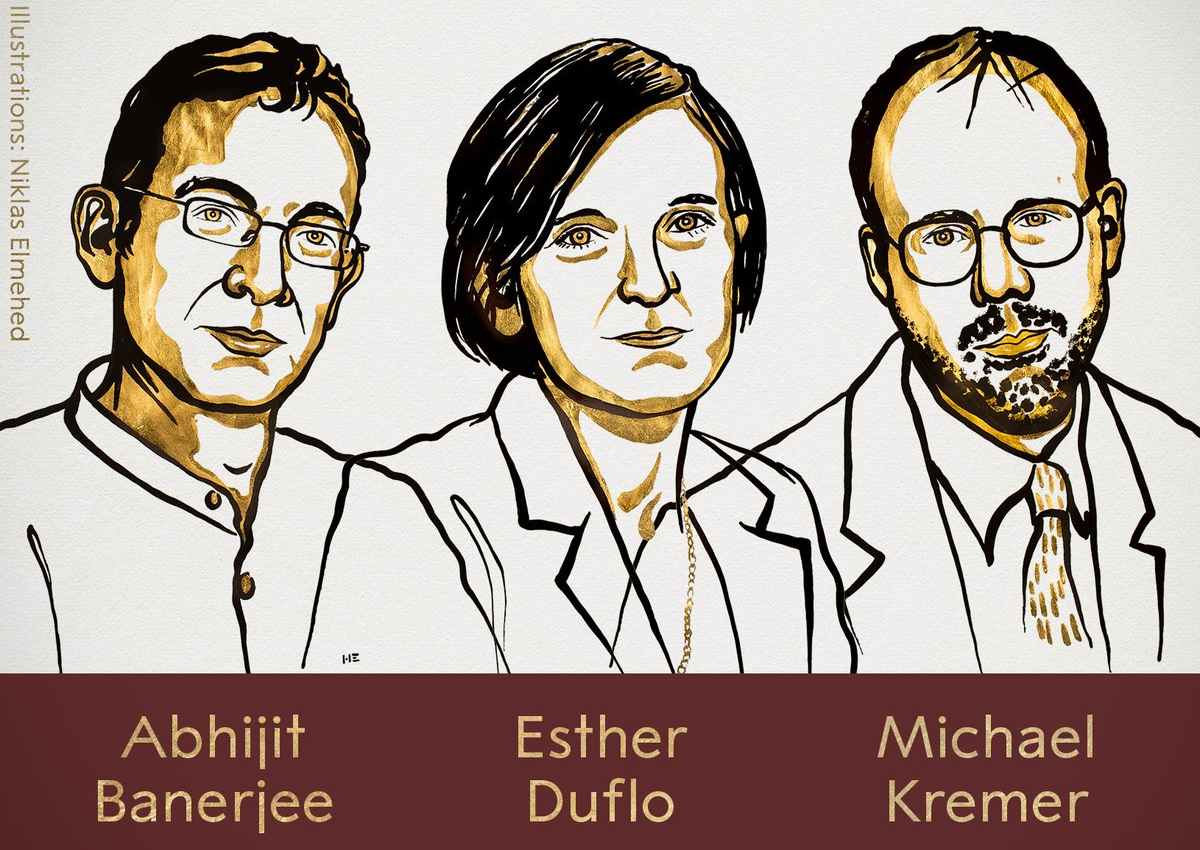Economy
Economics Nobel to Banerjee, Duflo & Kremer for work against global poverty

The 2019 Nobel Prize in Economic Sciences has been jointly awarded to Abhijit Banerjee, Esther Duflo and Michael Kremer for their powerful work on experimental approach towards alleviating poverty and obtaining reliable answers about the best ways to fight this global crisis in a relatively short period of time. Duflo, born in 1972, is the second woman and the youngest person to be awarded the prize in economics.
BREAKING NEWS:
The 2019 Sveriges Riksbank Prize in Economic Sciences in Memory of Alfred Nobel has been awarded to Abhijit Banerjee, Esther Duflo and Michael Kremer “for their experimental approach to alleviating global poverty.”#NobelPrize pic.twitter.com/SuJfPoRe2N— The Nobel Prize (@NobelPrize) October 14, 2019
The research, conducted by the three Laureates for a period of more than two decades, has transformed development economics. Their experimental approach involves breaking down the problem of global poverty into a number of smaller – but more precise and manageable – questions directed at individuals or groups. They then answer each of these using a specially designed field experiment.
“Despite recent dramatic improvements, one of humanity’s most urgent issues is the reduction of global poverty, in all its forms,” said the Royal Swedish Academy of Sciences on Monday.
“More than 700 million people still subsist on extremely low incomes. Every year, around five million children under the age of five still die of diseases that could often have been prevented or cured with inexpensive treatments. Half of the world’s children still leave school without basic literacy and numeracy skills,” it added.
2019 Economic Sciences Laureates Abhijit Banerjee and Esther Duflo, often with Michael Kremer, soon performed similar studies of other issues and in other countries, including India. Their experimental research methods now entirely dominate development economics.#NobelPrize
— The Nobel Prize (@NobelPrize) October 14, 2019
In the mid-1990s, the trio’s early field experiments in Western Kenya focused on helping weak students significantly improved the educational outcomes. Results pointed that help targeting the weakest pupils was an effective measure.
The Laureates’ work and subsequent research on the topic has “dramatically improved our ability to fight poverty in practice”. More than 5 million Indian children benefitted from programmes of remedial tutoring in schools as a direct result of their research. Introduction of heavy subsidies for preventive healthcare in several countries is also because of their work towards understanding poverty.
Banerjee, 58, and his wife Duflo, 46, are both professors at the US-based Massachusetts Institute of Technology (MIT), while Kremer, 54, is a professor at Harvard University, Cambridge, USA.
Abhijit Banerjee, born 1961 in Mumbai, India, studied at the country’s University of Calcutta and Jawaharlal Nehru University. He obtained his Ph.D. in 1988 from Harvard University. Paris-born Duflo pursued Ph.D. from Massachusetts Institute of Technology, Cambridge, USA, while Kremer, born in 1964, completed his Ph.D. from Harvard University in 1992.
Speaking to journalists post award announcement, Duflo said, “Showing that it is possible for a woman to succeed and be recognised for success I hope is going to inspire many, many other women to continue working and many other men to give them the respect they deserve.”
2019 Economic Sciences Laureate Esther Duflo, born in 1972, is the second woman and the youngest person to be awarded the Prize in Economic Sciences.#NobelFacts #NobelPrize pic.twitter.com/0Ek8E7kLRh
— The Nobel Prize (@NobelPrize) October 14, 2019
The Prize amount of 9 million Swedish krona will be shared equally between the Laureates.
Founded in 1739, the Royal Swedish Academy of Sciences is an independent organisation whose overall objective is to promote the sciences and strengthen their influence in society.
Till date, 51 prizes in Economic Sciences have been awarded between 1969 and 2019 which includes just two women – Elinor Ostrom in 2009 and Duflo.
The economics prize completes this year’s cycle of Nobels.
-

 Banking & Finance2 months ago
Banking & Finance2 months agoOman Oil Marketing Company Concludes Its Annual Health, Safety, Environment, and Quality Week, Reaffirming People and Safety as a Top Priority
-

 News2 months ago
News2 months agoJamal Ahmed Al Harthy Honoured as ‘Pioneer in Youth Empowerment through Education and Sport’ at CSR Summit & Awards 2025
-

 OER Magazines2 months ago
OER Magazines2 months agoOER, December 2025
-

 News2 months ago
News2 months agoAI Security Conference 2025 Hosted by Securado Highlights the Changing Cybersecurity Landscape
-

 Insurance1 month ago
Insurance1 month agoSupporting Community Wellness: Liva Insurance Sponsors Muscat Marathon 2026 with Free Health Checkups
-

 Interviews1 month ago
Interviews1 month agoEXCLUSIVE INTERVIEW: TLS Rebranding Marks Strategic Leap Toward Innovation, Sustainability & Growth
-

 Insurance3 weeks ago
Insurance3 weeks agoLiva Insurance Supports Community Wellness Through “Experience Oman – Muscat Marathon 2026”
-

 Banking & Finance4 weeks ago
Banking & Finance4 weeks agoA New Platform for SME Growth: Oman Arab Bank Unveils Tumouhi






























